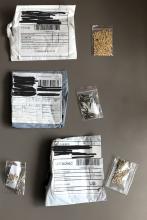The Resilient Food Systems Infrastructure (RFSI) program’s purpose is to strengthen the middle of the food supply chain in
"Ask an AURI Expert" office hours 2/27/25
The Agricultural Utilization Research Institute (AURI) is offering free group consultations with an AURI food scientist.
Each session starts with an AURI food scientist presenting a few minutes of educational content based on submitted questions or other relevant information. After that, they will answer questions in an open Q&A format. Guest experts may be available upon request.
Register for each session you're interested in attending. Sessions are offered virtually twice per month:
- 4-5 p.m. on the second Thursday of the month
- 11:30 a.m.-12:30 p.m. on the fourth Thursday of the month
Office hours are made possible through the Minnesota Resilient Food Systems Infrastructure program, which is funded by a cooperative agreement between the United States Department of Agriculture (USDA) and the Minnesota Department of Agriculture (MDA). The contents of the presentations and other program materials are solely the responsibility of the authors and do not necessarily represent the official views of the USDA or MDA.
The Minnesota Department of Agriculture’s Rural Finance Authority (RFA) Board has further expanded eligibility for zero-interest Disaster Recovery Loans available to Minnesota farmers whose operations have sustained livestock losses due to three animal diseases: avian Metapneumovirus (aMPV), highly pathogenic avian influenza (HPAI), and the H5N1 flu virus. The RFA Board is now allowing losses from April 1, 2024, to February 24, 2026, to be eligible for the loan program.
This is an expansion of the RFA Board action taken earlier this month which stated an emergency existed with aMPV, HPAI, and H5N1, opening the Disaster Recovery Loans to producers sustaining losses from February 2025 to February 2026.
aMPV is a highly infectious respiratory disease affecting poultry. HPAI is a contagious viral disease of domestic and wild birds and is fatal. H5N1, the same virus that causes HPAI in poultry, can also affect dairy cows and other animals; however, it rarely kills cows.
The Disaster Recovery Loan Program offers affordable financing to support Minnesota farmers after declared disasters or hardship events, such as animal disease outbreaks. These funds are available to farmers for expenses not covered by insurance, including replacement of flocks or livestock, building improvements, or to cover the loss of revenue when the replacement, improvements, or revenue loss is due to the confirmed presence of one of the three animal diseases. Eligible farmers will work with their local lender to secure the loans from the RFA.
The Minnesota Department of Agriculture's Rural Finance Authority is the state's agricultural lender with a mission to develop farm resources. RFA offers low-interest loan programs for a variety of farm activities.
More information, including full eligibility requirements, can be found on the Disaster Recovery Loan Program webpage.
###
Media Contact
Allen Sommerfeld, MDA Communications
651-201-6185
Allen.Sommerfeld@state.mn.us
The North Central USDA Regional Food Business Center (RFBC) focuses on expanding small and mid-sized agricultural value chains. Activities include technical assistance to create new value chain connections, expanding supply and demand to and from new and existing markets, improving viability and increasing market value of products, and boosting Upper Midwest regional food systems in response to supply chain weaknesses, small business challenges, and other difficulties exposed and exacerbated by the COVID-19 pandemic. The RFBC has a large network of partners and service partners that are available to provide technical assistance.
Assistance includes:
- Project development and consultation.
- Food business development services.
- Supply chain development and coordination.
- Grant writing support and grant administration guidance for RFSI, other USDA grant programs, and other third-party financial resources.
- Network referrals to other service providers with appropriate expertise.
Contact the North Central USDA RFBC:
- Find an RFBC technical assistance provider in your area


